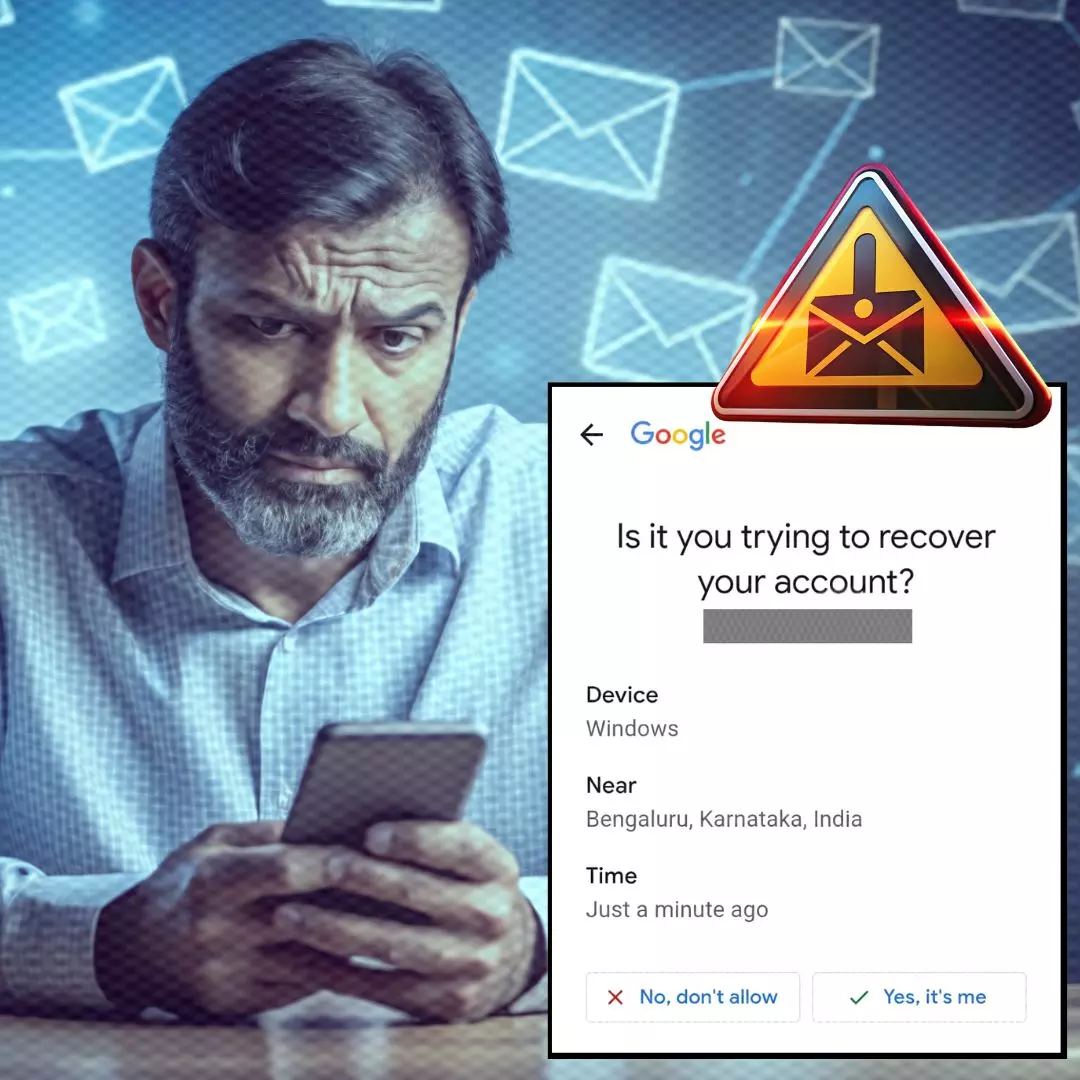
Representational Image
Beware: AI Scammers Target Gmail Users With Fake Recovery Requests
Writer: The Logical Indian Crew
We are an independent and public-spirited digital media platform for Indian millennials. We report news and issues that matter as well as give you the opportunity to take action.
India, 17 Oct 2024 7:21 AM GMT
Editor : The Logical Indian Team |
We are an independent and public-spirited digital media platform for Indian millennials. We report news and issues that matter as well as give you the opportunity to take action.
Creatives : The Logical Indian Crew
We are an independent and public-spirited digital media platform for Indian millennials. We report news and issues that matter as well as give you the opportunity to take action.
A new AI scam is tricking Gmail users into approving fake account recovery requests, putting personal data at risk.
A new and sophisticated AI-driven scam is targeting Gmail users, exploiting their trust through fake account recovery requests. This alarming trend poses a significant risk to over 2.5 billion Gmail accounts, as scammers employ advanced techniques to extract sensitive information from unsuspecting victims. Experts emphasize the need for consumers to remain vigilant and informed to combat this growing threat.
How the Scam Works
The scam typically begins with an unexpected notification on a user's device, requesting approval for a Gmail account recovery that they did not initiate. These requests often appear to originate from foreign countries, which can heighten anxiety and prompt hasty actions. If the user declines the request, scammers follow up with a phone call from what seems to be an official Google number. During this call, they employ professional-sounding AI-generated voices, creating a false sense of legitimacy by claiming suspicious activity on the user's account.
Scammers may then send spoofed emails that mimic genuine Google communications, further convincing victims to approve fraudulent recovery requests. This manipulation can lead to unauthorized access to personal accounts, making it crucial for users to recognize these tactics.
Expert Advice for Protecting Yourself
Sam Mitrovic, an IT consultant who has encountered this scam firsthand, offers several essential tips for Gmail users:
- Do Not Approve Unknown Recovery Requests: If you receive a notification for a recovery request that you did not initiate, do not approve it. This is often the first sign of a scam attempt.
- Verify Suspicious Phone Calls: Google rarely contacts users directly unless they are involved in business services. If you receive such a call, hang up and independently verify the number before responding.
- Examine Email Addresses Carefully: Spoofed emails can closely resemble legitimate communications. Always check for subtle discrepancies in the domain name or email address that could indicate fraud.
- Review Security Settings Regularly: Regularly check your Gmail security settings for any unfamiliar login attempts. Navigate to the “Security” tab in your account settings to review recent activity.
- Inspect Email Headers: For those more tech-savvy, examining the original email headers can help determine if an email was genuinely sent from Google servers.
Conscious Consumerism in the Digital Age
As scams become increasingly sophisticated, being a conscious consumer is more important than ever. Users must cultivate an awareness of potential threats and remain cautious when handling unexpected communications. Here are additional strategies for fostering a safer online experience:
- Educate Yourself: Stay informed about emerging scams and phishing tactics by following reliable tech news sources and cybersecurity blogs.
- Use Two-Factor Authentication: Enable two-factor authentication on your Gmail account to add an extra layer of security against unauthorized access.
- Report Suspicious Activity: If you suspect you have been targeted by a scam, report it immediately to Google and relevant authorities. This helps protect not only yourself but also others who may be at risk.
By implementing these practices and remaining alert to unusual activity, consumers can significantly reduce their vulnerability to scams like this AI-driven phishing attack. The key lies in vigilance and verification—two essential tenets of conscious consumerism in today's digital landscape.
Questions and Answers
1. What is the nature of the new AI scam targeting Gmail users?
The scam involves fake account recovery requests sent via email or notifications, followed by convincing phone calls from scammers posing as Google representatives. The aim is to extract sensitive information from users.
2. Who are the main victims of this scam?
Over 2.5 billion Gmail users are at risk, particularly those who may not be vigilant about unexpected notifications or phone calls claiming suspicious activity on their accounts.
3. How does the scam operate?
The scam starts with a fraudulent recovery request that appears legitimate. If denied, scammers call the victim using AI-generated voices, creating a sense of urgency and convincing them to approve the request.
4. What steps can users take to protect themselves?
Users should reject unsolicited recovery requests, verify any suspicious calls, scrutinize email addresses for authenticity, regularly check security settings for unusual activity, and inspect email headers when necessary.
5. Why is this scam particularly concerning?
The use of AI technology makes these scams more convincing and difficult to detect, increasing the likelihood that unsuspecting users will fall victim to identity theft or data breaches.
The Logical Indian's Perspective
At The Logical Indian, we believe in fostering a community that prioritises awareness and responsibility in the digital age. As technology evolves, so too must our vigilance against those who seek to exploit our trust. This scam serves as a stark reminder of the need for empathy and kindness in our interactions—both online and offline. By encouraging conscious consumerism and open dialogue about these threats, we can empower each other to navigate the digital landscape safely. How do you protect yourself against online scams? Share your thoughts and tips in the comments below!
 All section
All section














